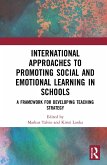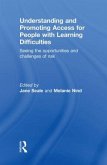Diane J. Goodman
Promoting Diversity and Social Justice
Educating People from Privileged Groups, Second Edition
Diane J. Goodman
Promoting Diversity and Social Justice
Educating People from Privileged Groups, Second Edition
- Gebundenes Buch
- Merkliste
- Auf die Merkliste
- Bewerten Bewerten
- Teilen
- Produkt teilen
- Produkterinnerung
- Produkterinnerung
Promoting Diversity and Social Justice gives theory, perspectives, and strategies that are useful for working with adults from privileged groups on diversity and social justice issues.
Andere Kunden interessierten sich auch für
![Acceptance, Understanding, and the Moral Imperative of Promoting Social Justice Education in the Schoolhouse Acceptance, Understanding, and the Moral Imperative of Promoting Social Justice Education in the Schoolhouse]() Teresa a CitroAcceptance, Understanding, and the Moral Imperative of Promoting Social Justice Education in the Schoolhouse61,99 €
Teresa a CitroAcceptance, Understanding, and the Moral Imperative of Promoting Social Justice Education in the Schoolhouse61,99 €![International Approaches to Promoting Social and Emotional Learning in Schools International Approaches to Promoting Social and Emotional Learning in Schools]() International Approaches to Promoting Social and Emotional Learning in Schools205,99 €
International Approaches to Promoting Social and Emotional Learning in Schools205,99 €![Social Justice Through Multilingual Education Social Justice Through Multilingual Education]() Social Justice Through Multilingual Education167,99 €
Social Justice Through Multilingual Education167,99 €![Promoting Assessment as Learning Promoting Assessment as Learning]() Ruth DannPromoting Assessment as Learning260,99 €
Ruth DannPromoting Assessment as Learning260,99 €![Promoting Teacher Advocacy as Critical Teacher Leadership Promoting Teacher Advocacy as Critical Teacher Leadership]() Jill Bradley-LevinePromoting Teacher Advocacy as Critical Teacher Leadership204,99 €
Jill Bradley-LevinePromoting Teacher Advocacy as Critical Teacher Leadership204,99 €![Understanding and Promoting Access for People with Learning Difficulties Understanding and Promoting Access for People with Learning Difficulties]() Understanding and Promoting Access for People with Learning Difficulties215,99 €
Understanding and Promoting Access for People with Learning Difficulties215,99 €![Narratives and Strategies for Promoting Indigenous Education Narratives and Strategies for Promoting Indigenous Education]() Narratives and Strategies for Promoting Indigenous Education77,99 €
Narratives and Strategies for Promoting Indigenous Education77,99 €-
-
-
Promoting Diversity and Social Justice gives theory, perspectives, and strategies that are useful for working with adults from privileged groups on diversity and social justice issues.
Hinweis: Dieser Artikel kann nur an eine deutsche Lieferadresse ausgeliefert werden.
Hinweis: Dieser Artikel kann nur an eine deutsche Lieferadresse ausgeliefert werden.
Produktdetails
- Produktdetails
- Verlag: Routledge
- Seitenzahl: 228
- Erscheinungstermin: 29. März 2011
- Englisch
- Abmessung: 235mm x 157mm x 17mm
- Gewicht: 487g
- ISBN-13: 9780415872874
- ISBN-10: 0415872871
- Artikelnr.: 31893266
- Herstellerkennzeichnung
- Libri GmbH
- Europaallee 1
- 36244 Bad Hersfeld
- gpsr@libri.de
- Verlag: Routledge
- Seitenzahl: 228
- Erscheinungstermin: 29. März 2011
- Englisch
- Abmessung: 235mm x 157mm x 17mm
- Gewicht: 487g
- ISBN-13: 9780415872874
- ISBN-10: 0415872871
- Artikelnr.: 31893266
- Herstellerkennzeichnung
- Libri GmbH
- Europaallee 1
- 36244 Bad Hersfeld
- gpsr@libri.de
Diane J. Goodman, Ed.D., is a trainer, college teacher, author, speaker, and consultant on diversity and social justice issues. For more information, see her website: http://www.dianegoodman.com.
Chapter 1: Introduction
* Update oppression chart: add gender oppression; change
"Anti-Semitism" to "Anti-Semitism and religious oppression" and list
other religious minorities; discuss "border identities" (Adams, Bell
and Griffin)
* New graphic to depict the intersectionality of our identities
Chapter 2: About Privileged Groups
* Update statistics
* Elaborate discussion of characteristics of privileged groups and
individuals
Chapter 3: Perspectives on Individual Change and Development
* p. 51- correct typo, change multiplicity or subjective to
relativism/procedural
* Update social identity models
Chapter 4: Understanding Resistance
* Add to reasons for resistance
Chapter 5: Preventing and Reducing Resistance
* Refine chart on intervention strategies
Chapter 6: The Costs of Oppression to People from Privileged Groups
* Add to costs of oppression
Chapter 7: The Joy of Unlearning Racism and the Benefits of Social Justice
* New chapter. Describe the psychological, intellectual, interpersonal,
spiritual, professional and other benefits white people experience
when they have worked to unlearn racism.
* Address the similarities to and relevance for unlearning other forms
of oppression as a member of the privileged group
* Move section on Benefits of Social Justice (p. 198-202) from current
Chapter 10 to this chapter. Expand this section.
Chapter 8: Why People from Privileged Groups Support Social Justice
Chapter 9: Developing and Enlisting Support for Social Justice
* Move revised versions of the sections "Shifting the Paradigm" and
"The Appeal of Partnership Relations and Social Justice to People
from Privileged Groups" (pp. 190-198) from current Chapter 10 to end
of this chapter.
Chapter 10: Allies and Action
* New Chapter. Discuss options for action, blocks to action,
accountability, what it means to be an ally, challenges of being an
ally, and particular issues for white men.
* Incorporate section on "From Motivation to Action: Allies and
Activism" (p. 163-167) in current Chapter 8 and section on "The Need
for Both Individual and Societal Change" from Chapter. 10.
Chapter 11: Issues for Educators
* Add greater discussion of the differences for educators from dominant
or subordinate groups
* Add more about dealing with triggers
* Discuss "mindful facilitation" (Lee Mun Wah)
* Update oppression chart: add gender oppression; change
"Anti-Semitism" to "Anti-Semitism and religious oppression" and list
other religious minorities; discuss "border identities" (Adams, Bell
and Griffin)
* New graphic to depict the intersectionality of our identities
Chapter 2: About Privileged Groups
* Update statistics
* Elaborate discussion of characteristics of privileged groups and
individuals
Chapter 3: Perspectives on Individual Change and Development
* p. 51- correct typo, change multiplicity or subjective to
relativism/procedural
* Update social identity models
Chapter 4: Understanding Resistance
* Add to reasons for resistance
Chapter 5: Preventing and Reducing Resistance
* Refine chart on intervention strategies
Chapter 6: The Costs of Oppression to People from Privileged Groups
* Add to costs of oppression
Chapter 7: The Joy of Unlearning Racism and the Benefits of Social Justice
* New chapter. Describe the psychological, intellectual, interpersonal,
spiritual, professional and other benefits white people experience
when they have worked to unlearn racism.
* Address the similarities to and relevance for unlearning other forms
of oppression as a member of the privileged group
* Move section on Benefits of Social Justice (p. 198-202) from current
Chapter 10 to this chapter. Expand this section.
Chapter 8: Why People from Privileged Groups Support Social Justice
Chapter 9: Developing and Enlisting Support for Social Justice
* Move revised versions of the sections "Shifting the Paradigm" and
"The Appeal of Partnership Relations and Social Justice to People
from Privileged Groups" (pp. 190-198) from current Chapter 10 to end
of this chapter.
Chapter 10: Allies and Action
* New Chapter. Discuss options for action, blocks to action,
accountability, what it means to be an ally, challenges of being an
ally, and particular issues for white men.
* Incorporate section on "From Motivation to Action: Allies and
Activism" (p. 163-167) in current Chapter 8 and section on "The Need
for Both Individual and Societal Change" from Chapter. 10.
Chapter 11: Issues for Educators
* Add greater discussion of the differences for educators from dominant
or subordinate groups
* Add more about dealing with triggers
* Discuss "mindful facilitation" (Lee Mun Wah)
Chapter 1: Introduction
* Update oppression chart: add gender oppression; change
"Anti-Semitism" to "Anti-Semitism and religious oppression" and list
other religious minorities; discuss "border identities" (Adams, Bell
and Griffin)
* New graphic to depict the intersectionality of our identities
Chapter 2: About Privileged Groups
* Update statistics
* Elaborate discussion of characteristics of privileged groups and
individuals
Chapter 3: Perspectives on Individual Change and Development
* p. 51- correct typo, change multiplicity or subjective to
relativism/procedural
* Update social identity models
Chapter 4: Understanding Resistance
* Add to reasons for resistance
Chapter 5: Preventing and Reducing Resistance
* Refine chart on intervention strategies
Chapter 6: The Costs of Oppression to People from Privileged Groups
* Add to costs of oppression
Chapter 7: The Joy of Unlearning Racism and the Benefits of Social Justice
* New chapter. Describe the psychological, intellectual, interpersonal,
spiritual, professional and other benefits white people experience
when they have worked to unlearn racism.
* Address the similarities to and relevance for unlearning other forms
of oppression as a member of the privileged group
* Move section on Benefits of Social Justice (p. 198-202) from current
Chapter 10 to this chapter. Expand this section.
Chapter 8: Why People from Privileged Groups Support Social Justice
Chapter 9: Developing and Enlisting Support for Social Justice
* Move revised versions of the sections "Shifting the Paradigm" and
"The Appeal of Partnership Relations and Social Justice to People
from Privileged Groups" (pp. 190-198) from current Chapter 10 to end
of this chapter.
Chapter 10: Allies and Action
* New Chapter. Discuss options for action, blocks to action,
accountability, what it means to be an ally, challenges of being an
ally, and particular issues for white men.
* Incorporate section on "From Motivation to Action: Allies and
Activism" (p. 163-167) in current Chapter 8 and section on "The Need
for Both Individual and Societal Change" from Chapter. 10.
Chapter 11: Issues for Educators
* Add greater discussion of the differences for educators from dominant
or subordinate groups
* Add more about dealing with triggers
* Discuss "mindful facilitation" (Lee Mun Wah)
* Update oppression chart: add gender oppression; change
"Anti-Semitism" to "Anti-Semitism and religious oppression" and list
other religious minorities; discuss "border identities" (Adams, Bell
and Griffin)
* New graphic to depict the intersectionality of our identities
Chapter 2: About Privileged Groups
* Update statistics
* Elaborate discussion of characteristics of privileged groups and
individuals
Chapter 3: Perspectives on Individual Change and Development
* p. 51- correct typo, change multiplicity or subjective to
relativism/procedural
* Update social identity models
Chapter 4: Understanding Resistance
* Add to reasons for resistance
Chapter 5: Preventing and Reducing Resistance
* Refine chart on intervention strategies
Chapter 6: The Costs of Oppression to People from Privileged Groups
* Add to costs of oppression
Chapter 7: The Joy of Unlearning Racism and the Benefits of Social Justice
* New chapter. Describe the psychological, intellectual, interpersonal,
spiritual, professional and other benefits white people experience
when they have worked to unlearn racism.
* Address the similarities to and relevance for unlearning other forms
of oppression as a member of the privileged group
* Move section on Benefits of Social Justice (p. 198-202) from current
Chapter 10 to this chapter. Expand this section.
Chapter 8: Why People from Privileged Groups Support Social Justice
Chapter 9: Developing and Enlisting Support for Social Justice
* Move revised versions of the sections "Shifting the Paradigm" and
"The Appeal of Partnership Relations and Social Justice to People
from Privileged Groups" (pp. 190-198) from current Chapter 10 to end
of this chapter.
Chapter 10: Allies and Action
* New Chapter. Discuss options for action, blocks to action,
accountability, what it means to be an ally, challenges of being an
ally, and particular issues for white men.
* Incorporate section on "From Motivation to Action: Allies and
Activism" (p. 163-167) in current Chapter 8 and section on "The Need
for Both Individual and Societal Change" from Chapter. 10.
Chapter 11: Issues for Educators
* Add greater discussion of the differences for educators from dominant
or subordinate groups
* Add more about dealing with triggers
* Discuss "mindful facilitation" (Lee Mun Wah)








